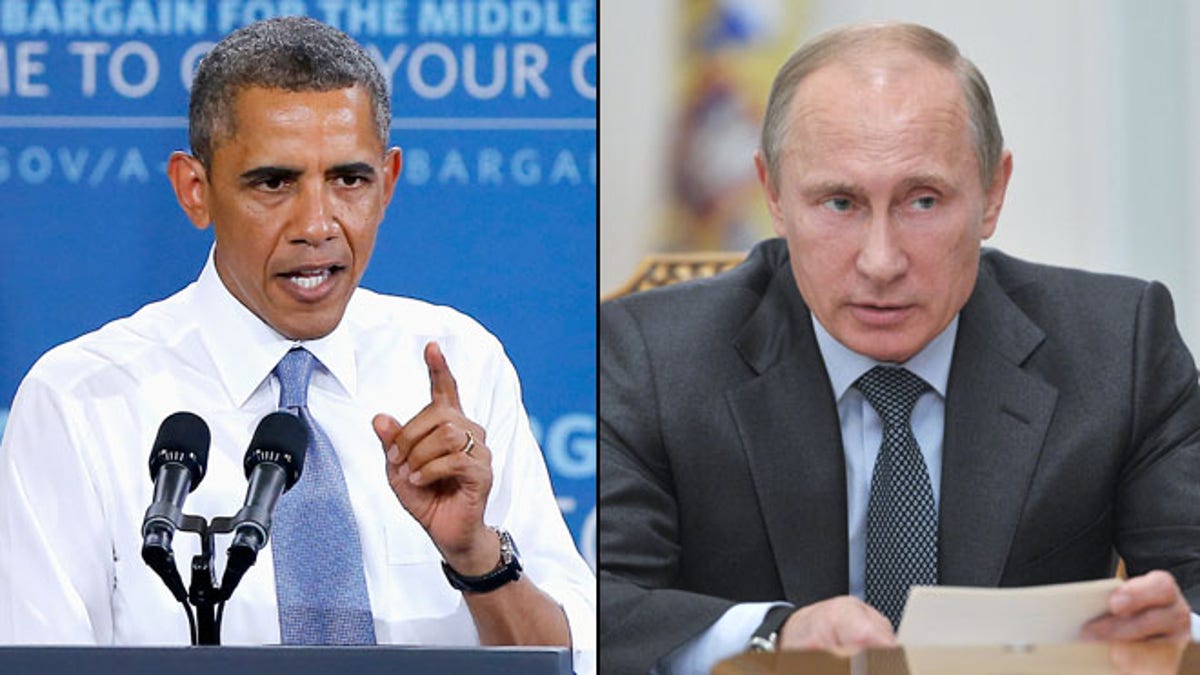
Shown here are President Obama, left, and Russian President Vladimir Putin. (AP)
President Obama is giving Vladimir Putin the cold shoulder, canceling plans to meet with the Russian president next month amid tensions over the decision to grant NSA leaker Edward Snowden temporary asylum.
White House Press Secretary Jay Carney said in a written statement that after a "careful review," the administration concluded that "there is not enough recent progress in our bilateral agenda with Russia to hold a U.S.-Russia Summit in early September."
Carney cited "achievements" with Russia on an arms-reduction treaty, as well as cooperation on Afghanistan, Iran and North Korea.
"However, given our lack of progress on issues such as missile defense and arms control, trade and commercial relations, global security issues, and human rights and civil society in the last twelve months, we have informed the Russian Government that we believe it would be more constructive to postpone the summit until we have more results from our shared agenda," Carney said. "Russia's disappointing decision to grant Edward Snowden temporary asylum was also a factor that we considered in assessing the current state of our bilateral relationship."
Daily politics news delivered to your inbox: sign up for our newsletter
He noted that Secretary of Defense Chuck Hagel and Secretary of State John Kerry are still slated to meet with their Russian counterparts in Washington.
Obama will still attend the Group of 20 economic summit in St. Petersburg, Russia, but a top White House official said the president had no plans to hold one-on-one talks with Putin while there. Instead of visiting Putin in Moscow, the president will add a stop in Sweden to his early September travel itinerary.
White House deputy national security adviser Ben Rhodes said Russia's decision last week to defy the U.S. and grant Snowden temporary asylum only exacerbated an already troubled relationship. And with few signs that progress would be made during the Moscow summit on other agenda items, Rhodes said the president decided to cancel the talks.
"We'll still work with Russia on issues where we can find common ground, but it was the unanimous view of the president and his national security team that a summit did not make sense in the current environment," Rhodes said.
Obama's decision to scrap talks with Putin is likely to deepen the chill in the already frosty relationship between the two leaders. They have frequently found themselves at odds on pressing international issues, most recently in Syria, where the U.S. accuses Putin of helping President Bashar Assad fund a civil war. The U.S. has also been a vocal critic of Russia's crackdown on Kremlin critics and recently sanctioned 18 Russians for human rights violations.
For its part, Moscow has accused the U.S. of installing a missile shield in Eastern Europe as a deterrent against Russia, despite American assurances that the shield is not aimed at its former Cold War foe. Putin also signed a law last year banning U.S. adoptions of Russian children, a move that was seen as retaliation for the U.S. measure that cleared the way for the human rights sanctions.
The U.S. was expected to alert the Russians Wednesday morning about Obama's decision to shutter the Moscow summit, though the two presidents were not expected to speak directly. Obama and Putin last met in June on the sidelines of the Group of 8 summit in Northern Ireland.
Obama, who is traveling in California, said in an interview Tuesday that he was "disappointed" by Russia's move to grant Snowden asylum for one year. But he said the move also reflected the "underlying challenges" the U.S. faces in dealing with Moscow.
"There have been times where they slip back into Cold War thinking and a Cold War mentality," Obama said in an interview on NBC's "The Tonight Show."
Snowden is accused of leaking highly secretive details about NSA surveillance programs. He first fled from the U.S. to Hong Kong, then made his way to Russia. He was marooned in the transit zone of a Moscow airport for more than a month before Russia granted him asylum last week.
For Russia, the decision could be used as cover to depict itself of a defender of human rights amid criticism from the U.S. and other nations of its tough crackdown on dissent.
The lower-level meetings with Russia underscore that the U.S. cannot completely sever ties with the Kremlin. Russian transit routes are critical to the U.S. as it removes troops and equipment from Afghanistan. And despite deep differences over Syria's future, the White House knows it will almost certainly need some level of Russian cooperation in order to oust Assad.
Still, some congressional lawmakers have called for Obama to not only scrub the Moscow summit but also demand that Russia forfeit its right to host the G-20 summit. Others have spoken of boycotting next year's Winter Olympics in the Russian city of Sochi.
In his interview Tuesday, Obama defended his decision to attend the G-20 summit, an annual gathering of the world's largest economies. Given the U.S. role in an increasingly interdependent global economy, Obama said it made sense to have high-level representation.
The G-20 summit is scheduled to take place in St. Petersburg on Sept. 5-6. Obama will make his first visit to Sweden ahead of the summit, though his itinerary is unclear.
The Associated Press contributed to this report.












































